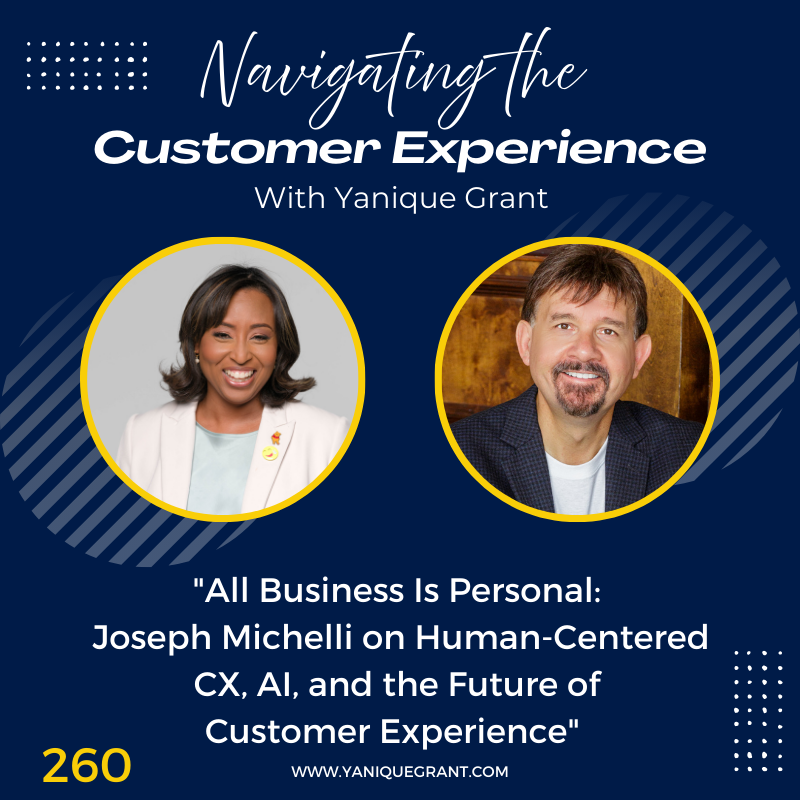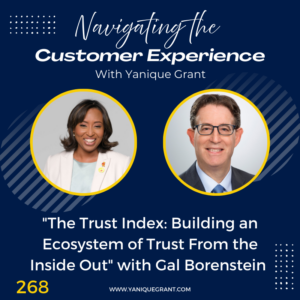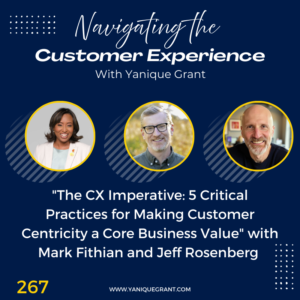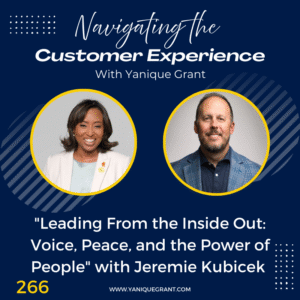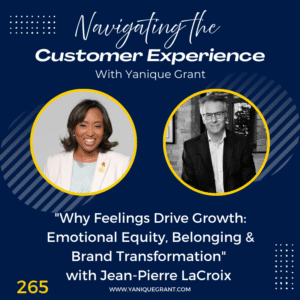Joseph Michelli is a certified customer experience professional, the author of thirteen business books about companies like, The Ritz-Carlton Hotel, Mercedes-Benz, Starbucks, Zappos and Airbnb. In addition to being a Wall Street Journal and New York Times #1 best-selling author, Joseph helps leaders and frontline team members improve the experiences they provide to colleagues and customers. Joseph is also an internationally sought-after keynote speaker on leadership and human experience design.
Questions
- Joseph, for both our listeners who already know you and those who may be hearing from you for the first time, can you share your journey from where you started to becoming an author, keynote speaker, and leadership thought leader?
- Now, you have a new book out that was published. Can you tell us a little about a little bit it?
- In researching this book, what are your thoughts on delivering service in healthcare, where medicine is such a personal experience? Many people feel more comfortable being physically in front of a doctor. Did you conduct any surveys or gather feedback about how patients feel receiving care in a digital space compared to the traditional in-person experience?
- As we approach 2026, what are the top two or three strategic priorities CX leaders should focus on?
- If you could share with us one thing that’s going on in your life right now that you’re really excited about, either something you’re working on to develop yourself or your people.
- What are the four core personality traits or competency, behavior competencies that a CX representative would need, and this could be for any industry.
- Before we wrap our episodes up, we always like to ask our guests, do you have a quote or saying that during times of adversity or challenge, you’ll tend to revert to this quote if for any reason you get derailed or off track, the quote kind of helps to get you back on track.
Highlights
Joseph’s Journey
Me: Joseph, you are our returning guest, so, I know for many of our guests who maybe are not familiar with your books that you’ve written, or even you as a person, as an international keynote speaker and as a leadership thought person, if you could just share with us a little bit about your journey, how you got from where you were to where you are today, to kind of re-orient our listeners who are accustomed to you, but also to introduce to those who never had an interaction or heard from you before.
Joseph stated that he blames his career and his mom and dad who told him, “You’re not on this world to be served, but you’re on this world to serve others.” And so, he had to find his way to do that, and clearly, he got a PhD in organizational psychology and came out as a consultant in the space of trying to help others serve well. And so, got to work with the Pike Place Fish Market early on, which led him to working and consulting for Starbucks, which led him to The Ritz-Carlton and on and on.
And each of those journeys ended up with books. And obviously, he’s had lots of clients that they haven’t written books about. But many of his more high-profile clients turned into books, and that just became a wonderful flywheel for him to be able to get into other businesses and help them emulate the success of some of the stories they told in these books.
About Joseph’s New Book: All Business Is Personal
Me: Now, you have a new book out that was published. Can you tell us a little about a little bit it?
Joesph stated that he does, it’s called All Business Is Personal: One Medical’s Human-Centered, Technology-Powered Approach to Customer Engagement. It’s one of those companies where you might say, who again is it you’re writing about? It’s one medical, they were purchased by Amazon for $4 Billion Dollars, so, Amazon clearly knew who they were.
He had worked with a guy who was the Chief Operating Officer for UCLA Health Systems. He went on to be the CEO at Stanford University Health Systems, and later on became the CEO of this startup tech company that was trying to change the way primary care delivered the human experience using lots of technology, lots of AI, lots of self-service options. But also making sure that it was human powered. And since healthcare is very much personal, using the technology to personalize your experience, but using the humans to make that personal connection.
So, ultimately, he wrote a book about them, having consulted for them before the pandemic, and watch them be really well positioned to deal with healthcare in a virtual world during the pandemic, and really come back out of that as a membership model that’s a part of Amazon now. So, listeners who have Amazon Prime can have a month of one medical for like $9 if you’re traveling somewhere and you want to use the app and want to know that you’re going to have a provider in the state that you’re traveling to. So, clearly that book is designed for people who have a heart for delivering human experiences, but leveraging what is real today, the technology that makes it easier for consumers to get their needs met.
Survey/Feedback On Patient Comfort and Experience in Digital Healthcare Versus In-Person Care
Me: So, in doing the research for this book, what are your thoughts in terms of delivering service like that? Medicine is such a personal thing, in terms of you and the doctor and feeling comfortable, and I think being physically in front of somebody makes you even feel more comfortable. I don’t know if you did any surveys in preparing for the book, or maybe even feedback that you’d have gotten from the organization in terms of how comfortable do people feel having that type of experience in a digital space versus what people are always accustomed to having the doctor be right there across the table from you?
Joseph shared that it’s always a learning curve on how much comfort people have. Right now we’re not willing to have AI purchase our shoes. It can recommend what shoes we should buy. There’ll be a time when our AI agent will purchase those shoes, do the reorders for us, it’ll happen in the backstage, right now we’re not ready for that, as a rule, if you look at the data. But we’ll give it up in time, just as we gave up so many other things because of the convenience was worth that autonomy, if you will.
In healthcare, really, what they did at one medical in the journey that he was part of, was asked, what is it that we can replace with technology that is really just terrible experience right now?
So, in the old days, to get an appointment for primary care physician, you had to call them during their regular office hours, instead of being able to go on an app and schedule whichever available physician there was that met your schedule. So, maybe you had 7 clinicians in an office, you didn’t have the ability to look at all 7 calendars and find out which one was available when you needed to be seen. But they figured that out, and One Medical became a leader in that. When you went to the waiting room and you sat in the waiting room, often you sat long past the time that you had scheduled, that should have been reserved for you. And so, 97% of the time at One Medical, the technology enabled them to do the workflows so that you could be seen within 3 minutes of your appointment.
And then, just one last example of the redesign, why do you have to sit in a waiting room and an exam room both? Why can’t we just have the provider come out, walk to the waiting room, and walk you back right into care. And some of those things they were able to do, along with AI taking notes during the session so that the physician could look at you and not have to look at the chart the whole time.
So, what you’re seeing is that it depends on where you put the technology. If you put it out in front of people, when people want people, then it doesn’t work. If you make it available so that you can have more time with people, then it’s beloved.
And he thinks there’s a lot of problems now outside of healthcare, just if you look at the way people are using AI or chatbots, it’s really hard to find the person. And when you can’t find an 800 number, you can’t find a human. Yes, technology first for convenience, but you better be able to opt human on the backside.
Me: Agreed. I’m happy that you kind of dovetailed and spoke about that because I think it’s so important. There’s this big hype with artificial intelligence, and a lot of companies want to find ways to integrate it. I don’t know if they think that it means that they won’t need people anymore, but you still need the human component. I give an example of I was having an issue with my telecommunication company, and I was talking to the bot, but the bot, of course, clearly has predisposed responses that they were programmed to give, and so at this point, I’m highly frustrated, because even after re-changing the way how I asked the question, changing the verbiage to try and see if the bot would be able to assist me, I had to eventually say, I need to speak to a representative. And it took forever. I think I believe the transition between bot and representative, let’s say I was on the platform trying to get Representative from 10:30 am in the morning, a live human being didn’t get connected to me until 4:30 pm in the afternoon. By this, I’d bypassed the entire digital space and just went straight to call the company to see if I could get the issue resolved. And of course, I got it resolved. So, when somebody came on at 4:30 pm to say, “Hey, I’m Amy, how can I help you?” I’m just like, isn’t there supposed to be, like, a standard transition, it can’t be that it’s going to take 6 hours for a live human being to pick up where the bot left off.
Joseph shared that because they expect so much of it to be completed by the bot, you would think they would have some time for the people who are needed to be able to jump in when the bot doesn’t work, but the structure of these things is very complicated. To balance technology with human service delivery is an art form, and he thinks it’s going to become increasingly challenging as technology becomes more of the panacea for everything. And so, he does believe we need to be on the cutting edge of technology, not maybe the leading edge, because there are a lot of brands that need to take those hit points, but a lot of us need to be fast followers at the same time, we have to be very sensitive to how much of our brand relates to our ability to have humans interface with us. Because if you don’t have a very caring, smart human who maybe is aided by the AI to answer your questions, you’re going to end up just being at the mercy of whoever has the best technology, and not a lot of loyalty is going to be had for that.
Strategic Priorities for CX Leaders in 2026
Me: So, we always want to pick your brain on trends in the CX space, because you’ve written tons of books with leading organizations across different industries, and you keynote speak across the globe. So, we’re a little bit past the mid of 2025 and I know organizations are looking for what they need to focus on for 2026. If you could pick maybe two to three main things that CX leaders and organization from a strategic perspective needs to focus on for 2026 as it relates to CX, what would those two to three things be?
Joseph shared that unfortunately, he’s going to go straight to AI for one. He does think you now more than ever, need to be aware of the fact that in the not-too-distant future, people are not going to be interacting with you much. Their AI is going to be interacting with your presentation through your AI. A lot of this stuff’s going to happen in the backstage. So, you really do need to understand how is AI responding to you right now, if he was to type whatever you do in your market, and given what AI knows about him and all the use of AI and all the things that he interacts with it on, and if he’s your demo, are you coming up first?
Is AI saying, “Come to this person in your area under these parameters” if you’re not there, you’re really going to be missing out on the opportunity. Once you get people there, then it becomes very important to realize that they’re going to want convenience above all else, and then hyper personalization. They want to be able to make their life as convenient as possible. But when you make an offer to them, it best be something that’s curated for them. So, in a trending way, he’s been doing this with Starbucks for a long time, but if you are somebody who is consuming Starbucks products that are low fat, you do not want them to push a message about the most high caloric product on the menu and brands that continue to be tone deaf to the people they’re speaking to are soon going to be one coupon away from being replaced by a competitor.
Me: So, AI is one, what would be two and three?
Joseph stated that the hyper personalization was snuck in there a bit. He thinks that the humans who are well trained to use the tools that you bring forward is another and that can deliver at personalization and the personal, all that’s kind of blended in his top three.
What Joseph is Really Excited About Now!
When asked about something he’s really excited about, Joseph shared that he just launched through Campbellsville University, a Master’s Degree in Customer Experience. He’s been a party to this field for a long time. He was really excited when the customer experience professional association was launched so they could create core competencies for this profession called CX. But he also knew they didn’t have a lot of academic research going on in the field, and they weren’t training people with academic credentials alongside of on-the-job training.
So, lots of people come over from being a Chief Operating Officer, suddenly they’re the Chief Experience Officer. So, they really want to train people on what it takes to do persona based journey mapping, what it takes to create ecosystem maps, what are the tools of the trade that you need to be effective at helping your organization attract more customers, ensure the customers you have buy more and tell their friends about you.
Me: What’s the name of the university that’s offering that?
Joseph stated it’s called Campbellsville University, all online Master’s Degree Program. They’ve got people from Mercedes, they’ve got people from amazing brands who are enrolled right now in the first cohort for that master’s degree class, Master’s of Science in CX.
Core Personality Traits and Behavioural Competencies for CX Representatives Across Industries
Me: Now, Joseph, you are a CX thought leader and I know CX is a broad topic, it covers a whole bunch of things and different industries. And sometimes I get asked, when we hire people, they come to the table, they may have the credentials that we’re looking for academically, and they may create a facade that gives us the impression that their personality is well needed for our organization, or matches with our core values, or even our mission and our vision. But as a subject matter expert in this area, I’m sure you’re good at identifying personality traits in people that would be well suited for the CX space, you had mentioned someone who’s smart, someone who cares, someone who’s passionate. If you were to find, let’s say, the four core personality traits or competency, behaviour competencies that a CX representative would need, and this could be for any industry, what would you think those four or five would be?
Joseph stated that they are the components of emotional intelligence, without a doubt. So, he would start with realizing that emotional intelligence is a learnable skill set, but some people come to you with very well developed emotional intelligence, and you want to try to find the most emotionally intelligent people you can.
You’re going to do that through behavioural interviewing. You’re going to determine the degree to which people can demonstrate empathy. You’re going to give people lots of scenarios, and you’re going to ask them, what do you think people might be feeling in these scenarios?
You’re going to give them lots of scenarios where people are out of control and angry customers, and you’re going to try to see how they would give you a response for managing the emotions of others.
If we think about emotional intelligence, it’s largely in our ability to manage our own emotions to achieve success, our ability to read the emotions of others and then accommodate so that those people can leave with a positive emotional experience.
Those are two very important things.
And he also believes it’s pretty critical for us to be able to know what emotions we want people to feel in our business. So, in addition to selecting people, we need to train them on when you come to work for me, here’s what I want every customer to feel every single time, no excuses. Now, let me give you some scenarios, and you tell me how you think you could help a customer like this, leave like that. And you’ll see people who can, on the fly, create an experience that takes maybe an angry customer and has them exit the building in that emotional state that is your branded customer experience.
Me: I like that one, that’s really good, excellent. Because I do find sometimes we’re hiring driven so much based on the academics, you want people to be able to speak well, or they must have an excellent background or years of experience in a particular industry. But when it comes to the people skills, and the people component is so important because there are very few businesses that I found that you sit behind a desk and you have no interaction with another human being, absolutely none in the course of your day, even if you’re an accountant, you still have to deal with people.
And I think the more we’re able to as leaders in organizations, whether you’re in charge of CX or not, can get people who have good people skills, even from an internal customer service perspective, is so important, because then you’ll be able to retain your talent. Because people will feel like they’re growing, they’re developing, they’re dealing with people who are understanding and compassionate, and will work to help them grow, versus someone who they feel doesn’t care about them or doesn’t know how to deal with people, they don’t know how to speak to them, and it’s going to demotivate them, and then your attrition ends up being high, and you’re just having that cycle repeat itself over and over.
Joseph agreed. And when we’re teaching somebody like at a master’s degree level, and they’re teaching a leader, they’re talking about change management skills, they’re talking about solid business skills. Because CX is not a fluffy thing. You need to be able to move the needle on return on experience. You need to be able to get money back from investing in this process.
So, clearly, leaders need to have all those emotional intelligence skills, along with influence skills, along with persistence, along with visioning, all of that. But when we’re talking about just hiring at a frontline level, you better have people who can understand and read people, because that’s what this is about. We are in the business of nuancing, he liken to say really quickly to manufacturing. If he was manufacturing, he’d have raw material that’s completely consistent. He’d impose a process on it, and he’d want a .001 defect at the end.
Unfortunately, when you’re dealing with people, we have no consistency of the folks who comes into our building as customers. Our job is to impose some level of process on it. You can’t run a business without some processes, but we also have to be able to nuance those processes based on the variances in the raw material that walks in the door. And then we still have to try to have a consistent outcome where people feel the same when they leave, because that is the branded experience we want them to feel. So, the art is having people who can nuance your processes and execute to deliver your branded experience.
Quote or Saying that During Times of Adversity Joseph Uses
When asked about a quote or saying that he tends to revert to, Joseph shared that he would just say, “Service serves us.” And so, whenever he’s starting to feel like, “God, these people are taking so much, or, why do I have to keep serving? Or, like enough is enough.”
He just reminds himself that it isn’t, it is through the art of serving that we are served. If we seek value to create value in the world, we are valued. And so, it’s the same about being more interested than interesting. Like focus more on the other person, and you’ll become interesting to that person. Focus on trying to be interesting, and guess what happens? People just see you as vain. So, he really believes keeping his eye on, “I’m here to serve, and that in serving, I too will be served.”
Me: It’s funny you said that, because I do believe that just life as a whole, in terms of being a human being, I think we’re all put on this earth to serve each other, let’s just take the business out of it and the CX out of it. Just even in your own communities, your next door neighbour, somebody who you’re walking on the road by, I just believe that we’re all here to serve each other. And I believe if everybody had that mentality as human beings across the globe, I think the world would just be even more caring.
Joseph shared that he did a video once about the importance of returning your shopping cart. And you’d been surprised at how many haters there were that said, “I’m not here to go and take a shopping cart back, they hire people for that.” So, he doesn’t know that everyone holds that view. And so, there is the risk that if you serve others, you’ll be taken advantage of, he doesn’t encourage that. He says, serve others up to the point where they treat you like a servant, and at that point you have to put a firm limit down and say, “No, I’m a service professional, and if you’re not valuing me as a human being, then I’ll go find someone else who can be served.” So, he loves that you think that way, he doesn’t know that everybody does, and he’s not encouraging people to be a doormat to other humans, but he thinks you serve first, and most of the time, thanks to reciprocity rules, you’re going to get it back.
Me: Yeah, true.
Alright Joseph. Well, thank you so much for taking time out of your very busy schedule and jumping on our podcast again, we’re so happy to have you as a returning guest, sharing about your new book All Business Is Personal, as well as some of the different organizations that you’ve worked with. This new Master’s in Customer Experience that you’re offering through the university, and we’ll have the link for that in the show notes of this episode. And some of the behavioural competencies that you believe as a sales professional, you need to embody in your day-to-day interactions in order to create that brand experience for each company and the interactions that they have. I think it was a great conversation again, and we just want to say thank you so, so much for taking time to join us today.
Please connect with us on X @navigatingcx and also join our Private Facebook Community – Navigating the Customer Experience.
Links
The ABC’s of a Fantastic Customer Experience
Grab the Freebie on Our Website – TOP 10 Online Business Resources for Small Business Owners
Do you want to pivot your online customer experience and build loyalty – get a copy of “The ABC’s of a Fantastic Customer Experience.”
The ABC’s of a Fantastic Customer Experience provides 26 easy to follow steps and techniques that helps your business to achieve success and build brand loyalty.
This Guide to Limitless, Happy and Loyal Customers will help you to strengthen your service delivery, enhance your knowledge and appreciation of the customer experience and provide tips and practical strategies that you can start implementing immediately!
This book will develop your customer service skills and sharpen your attention to detail when serving others.
Master your customer experience and develop those knock your socks off techniques that will lead to lifetime customers. Your customers will only want to work with your business, and it will be your brand differentiator. It will lead to recruiters to seek you out by providing practical examples on how to deliver a winning customer service experience!

